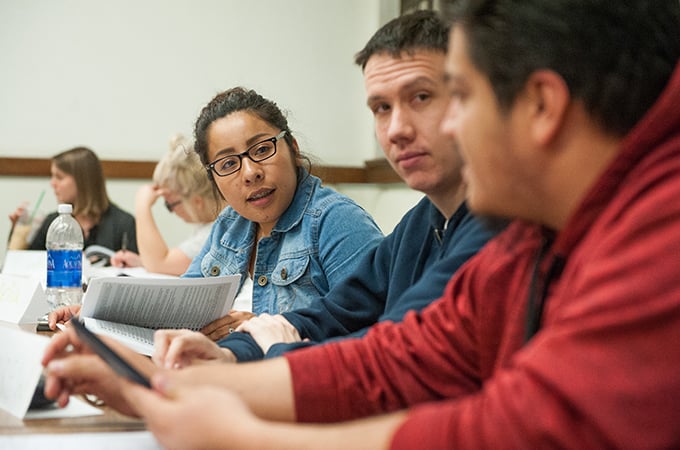In light George Floyd’s death in Minneapolis, Minnesota, and the nationwide protests that followed, communities around the country are beginning to have challenging conversations—including those at the University of Redlands. In addition to implementing a number of immediate measures to address racial equity and justice on campus with more to come, the University’s schools and departments have come together to discuss how they plan to move forward.
The School of Education, which houses a Center for Educational Justice and whose programs have an educational justice ethos, reached out to students and alumni to ask what a commitment to educational justice means to them and how they plan to address inequities that exist in their fields. Here are some of their responses, edited for length and clarity.
“I demonstrate my commitment to educational justice by acknowledging, validating, and listening to others' stories with an open heart—free of judgment and critique. I also commit to educational justice by continually addressing my biases, prejudices, misconceptions, and stereotypes to the best of my ability.”—Nancy Martinez ’20 (Doctorate in Leadership for Educational Justice)
“I will continue to make a difference by dedicating myself to having difficult discussions with my colleagues, friends, and family. I will continue to acknowledge my own biases and challenge myself to grow and be better.”—Jillian Strong ’20 (MA in Higher Education, Student Affairs)
“Having been educated in a system that continues to repress the aspirations and opportunities of Black students, I am dedicated to ensuring the academic survival of Black students and all students of color.”—Glenn Scott ’21 (Doctorate in Leadership for Educational Justice)
“My commitment to educational justice is to be courageous in sharing my experiences as a Hispanic female educator so that individuals have a clear picture of what is going on and what needs to change.”—Vanessa Pérez Kung ’21 (Doctorate in Leadership for Educational Justice)
“As a K-12 administrator, I continue to bring to light the notion that without adequate academic preparation, marginalized students confront limited postsecondary education and career opportunities, leaving them vulnerable and putting them at risk for living in areas of concentrated poverty with limited economic and social resources. The educational system should not accept anything less [than educational justice] if they are to move forward and value diversity and the inclusion of all students.”—Julio Omier ’20 (Doctorate in Leadership for Educational Justice)
“I feel the call to pursue my education so that I can make a bigger impact on the world around me. All human life is precious, and those who have been oppressed deserve interventions in their favor that will work to eliminate the school-to-prison pipeline.”—Ariana Cervantes-Borges ’21 (MA in School Counseling)
“It is important to enlighten students of different cultures who may not know what it means to be Black in America. I am a Black man who has found a way to become a teacher in a system that is not designed for Black male teachers to exist. This country was built on slavery and oppression of non-white people and is ruled by white people who continue to be misinformed and psychologically disconnected from what Black people go through every day. I will be a model of compassion and love—not anger, hatred, or unforgiveness.” —Donald Hodges ’20 (Preliminary Teaching Credential)
“I will make a difference as a teacher by creating a classroom based on multiculturalism that aims to dismantle institutional racism.” —Stephanie Havers ’21 (MA in Learning and Teaching)
“I commit to educational justice by having honest and open conversations about the injustices in this country, especially racism, and educating others. I aim to understand policies and laws and encourage others to speak up and do the right thing, including voting for a better future and being the change.”—La Price Sanford ’20 (Doctorate in Leadership for Educational Justice)
“I commit to promoting a school culture where students feel safe to learn, to make mistakes, to grow, and to unapologetically be themselves. In my role as a school counselor, I am committed to becoming is a positive visible force on campus. I am committed to making sure students feel validated, supported, important, seen, and heard. I am committed to fostering an environment of collaboration and teamwork in order to build an inclusive future.” —Naoje Williams ’20 (MA in School Counseling)
Learn more about the School of Education.






